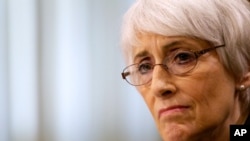Diplomats from Iran, the United States and European Union are set to meet Thursday in the latest talks to implement an agreement on Iran's nuclear program.
Iranian Deputy Foreign Minister Abbas Araqchi will meet in Geneva with U.S. Undersecretary for Political Affairs Wendy Sherman and EU deputy foreign policy chief Helga Schmid.
Iranian Foreign Minister Mohammed Javad Zarif expressed optimism ahead of the talks, saying Iran is committed to working toward putting into place the agreement it reached with world powers in late November.
He also praised the several rounds of expert-level meetings between Iran and the group that includes the five permanent members of the United Nations Security Council and Germany. Zarif said those discussions on the details of how to curb Iran's nuclear program in exchange for limited sanctions relief "have achieved positive results."
U.S. State Department spokeswoman Jen Psaki said Wednesday she did not want to predict when the agreement would begin to be implemented, but that the U.S. would like it to be "soon." She said the two sides are working on "a few remaining issues."
The nuclear deal is a six-month agreement designed to give both sides some of what they are seeking while they work on a more comprehensive pact.
Within a year, the two sides want to reach a long-term deal to ensure Iran is not developing nuclear weapons, with the international community lifting all of the sanctions levied against the country.
Iran has insisted its nuclear program is solely for peaceful purposes.
Iranian Deputy Foreign Minister Abbas Araqchi will meet in Geneva with U.S. Undersecretary for Political Affairs Wendy Sherman and EU deputy foreign policy chief Helga Schmid.
Iranian Foreign Minister Mohammed Javad Zarif expressed optimism ahead of the talks, saying Iran is committed to working toward putting into place the agreement it reached with world powers in late November.
He also praised the several rounds of expert-level meetings between Iran and the group that includes the five permanent members of the United Nations Security Council and Germany. Zarif said those discussions on the details of how to curb Iran's nuclear program in exchange for limited sanctions relief "have achieved positive results."
U.S. State Department spokeswoman Jen Psaki said Wednesday she did not want to predict when the agreement would begin to be implemented, but that the U.S. would like it to be "soon." She said the two sides are working on "a few remaining issues."
The nuclear deal is a six-month agreement designed to give both sides some of what they are seeking while they work on a more comprehensive pact.
Within a year, the two sides want to reach a long-term deal to ensure Iran is not developing nuclear weapons, with the international community lifting all of the sanctions levied against the country.
Iran has insisted its nuclear program is solely for peaceful purposes.









